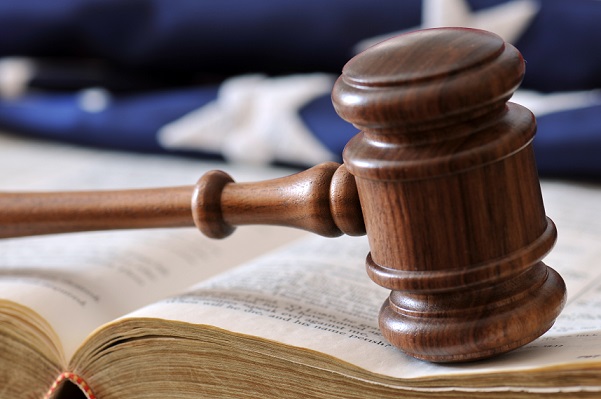
In the modern commercial world, practically every business sets up a web site, which means that the business must also select a domain name. It is often desirable for the business to select a domain name that is the same as its business name, trademark or service mark, in order to help the consuming public find the products or services of the business on the Internet. The US Supreme Court recently made it a bit easier to register a domain name as a trademark.
Prior to June 30, 2020, the U.S. Patent and Trademark Office (USPTO) did not allow domain names to be registered as trademarks if they contained words that were generic as to the goods or services provided, since generic words cannot function as trademarks. A top-level domain (TLD) suffix such as “.com” or “.net” was also considered generic in the same way as suffixes such as “Co.” or “Inc.” Under this rubric, the USPTO considered that when a generic word is combined with a generic TLD suffix in a domain name, the result was also generic, and therefore not registerable as a trademark. This approach was eliminated on June 30, 2020, in a ruling by the U.S. Supreme Court in the case of US Patent and Trademark Office, et al v. Booking.com B.V.
The Booking.com decision may be better understood after a brief review of trademark principles. A trademark is a word, symbol or device that is used in commerce in connection with goods. (A service mark is used in connection with services, but references in this article to “trademark” are meant to include service marks.) The function of a trademark is to help the consuming public identify the source of particular goods or services. US trademark law recognizes that there is a spectrum of trademark protection ranging from marks that are legally strong to those that are legally weak, and those that cannot be protected at all. Strong trademarks are those which are arbitrary, fanciful or suggestive with respect to the goods or services they are used on. Descriptive terms are usually not entitled to trademark protection, but can become enforceable over time as the public learns to associate the descriptive mark with the source of goods or services provided under the descriptive term (e.g., think American Airlines, National Football League, etc.). Generic terms, on the other hand, are never available as trademarks because they cannot act as source identifiers, since their primary function is to identify classes of goods or services.
In the Booking.com case, the USPTO had concluded that “booking” was a generic term for its services of “making travel reservations” and that the “.com” TLD suffix was also generic since it only served to identify a commercial website. The USPTO therefore concluded that the combination of “Booking.com” was not registrable because the combination was generic or, in the alternative, that it was descriptive without secondary meaning. The USPTO decision was first taken to the District Court, then to the Fourth Circuit Court of Appeals, and finally to the US Supreme Court. In an 8-1 decision authored by Justice Ginsburg, the Supreme Court held that a term styled ‘generic.com’ is a generic name for a class of goods or services only if the term has that (generic) meaning to consumers. Thus, adding a TLD suffix (such as “.com”) to a generic word (such as “bookings” for “making travel reservations”) could be registerable as a trademark under the proper circumstances, and that simply combining a generic term to a TLD suffix alone did not disqualify the combination from being registered. The USPTO argued that a TLD suffix is generic like entity signifiers “Inc.” and “Co.” However, the court found that a TLD suffix is not sufficiently similar to such generic identifiers because each domain name is unique, and (unlike “Inc.” and “Co.”) only one entity can use a particular domain name. Thus, the court found a ‘generic.com’term could convey to consumers an association with a particular website – which is the source identification function of a trademark. However, the decision made note of numerous limitations already in place under trademark law, including a requirement that the domain name overcome any descriptiveness issues (e.g., by establishing secondary meaning). Thus, to register a ‘generic.com’ domain name, it will need to be shown that the domain name has established secondary meaning to overcome descriptiveness issues, and that consumers have come to associate the domain name with the business as the source of the goods or services, instead of simply identifying that class of goods or services. Extensive advertising was submitted in the Booking.com case (e.g., “Booking.com, booking.yeah!”, see https://www.youtube.com/watch?v=tk_pFjr5aV4), helping the court conclude that it had established secondary meaning in the mind of the consumer for the Booking.com mark.
Of course, it is easier to register and enforce trademark rights in terms that are neither generic nor descriptive, so a business owner should avoid selecting generic or descriptive terms for its trademarks, business name, and domain name if that is possible. An effective trademark should not only aid in attracting clients and customers, it should also provide the business with enforceable trademark rights that allow the business to prevent competitors from using confusing similar terms and phrases to promote their businesses. However, if a descriptive or generic term has already been selected for the domain name, the Bookings.com case leaves the door open for the owner of such a term to protect it as a trademark.
Sierra IP Law assists businesses with evaluating their existing or proposed trademarks and service marks, and works with its clients to find effective, enforceable, and registerable marks that will serve them well. If you have questions about trademarks, visit our trademark FAQ page, general trademark page, and our trademark registration page.
© 2020 Sierra IP Law. The information provided herein is not intended to be legal advice, but merely conveys general information that may be beneficial to the legal professional community, and should not be viewed as a substitute for legal consultation in a particular case.

"Mark and William are stellar in the capabilities, work ethic, character, knowledge, responsiveness, and quality of work. Hubby and I are incredibly grateful for them as they've done a phenomenal job working tirelessly over a time span of at least five years on a series of patents for hubby. Grateful that Fresno has such amazing patent attorneys! They're second to none and they never disappoint. Thank you, Mark, William, and your entire team!!"
Linda Guzman

Sierra IP Law, PC - Patents, Trademarks & Copyrights
FRESNO
7030 N. Fruit Ave.
Suite 110
Fresno, CA 93711
(559) 436-3800 | phone
BAKERSFIELD
1925 G. Street
Bakersfield, CA 93301
(661) 200-7724 | phone
SAN LUIS OBISPO
956 Walnut Street, 2nd Floor
San Luis Obispo, CA 93401
(805) 275-0943 | phone
SACRAMENTO
180 Promenade Circle, Suite 300
Sacramento, CA 95834
(916) 209-8525 | phone
MODESTO
1300 10th St., Suite F.
Modesto, CA 95345
(209) 286-0069 | phone
SANTA BARBARA
414 Olive Street
Santa Barbara, CA 93101
(805) 275-0943 | phone
SAN MATEO
1650 Borel Place, Suite 216
San Mateo, CA, CA 94402
(650) 398-1644. | phone
STOCKTON
110 N. San Joaquin St., 2nd Floor
Stockton, CA 95202
(209) 286-0069 | phone
PORTLAND
425 NW 10th Ave., Suite 200
Portland, OR 97209
(503) 343-9983 | phone
TACOMA
1201 Pacific Avenue, Suite 600
Tacoma, WA 98402
(253) 345-1545 | phone
KENNEWICK
1030 N Center Pkwy Suite N196
Kennewick, WA 99336
(509) 255-3442 | phone
2023 Sierra IP Law, PC - Patents, Trademarks & Copyrights - All Rights Reserved - Sitemap Privacy Lawyer Fresno, CA - Trademark Lawyer Modesto CA - Patent Lawyer Bakersfield, CA - Trademark Lawyer Bakersfield, CA - Patent Lawyer San Luis Obispo, CA - Trademark Lawyer San Luis Obispo, CA - Trademark Infringement Lawyer Tacoma WA - Internet Lawyer Bakersfield, CA - Trademark Lawyer Sacramento, CA - Patent Lawyer Sacramento, CA - Trademark Infringement Lawyer Sacrament CA - Patent Lawyer Tacoma WA - Intellectual Property Lawyer Tacoma WA - Trademark lawyer Tacoma WA - Portland Patent Attorney - Santa Barbara Patent Attorney - Santa Barbara Trademark Attorney